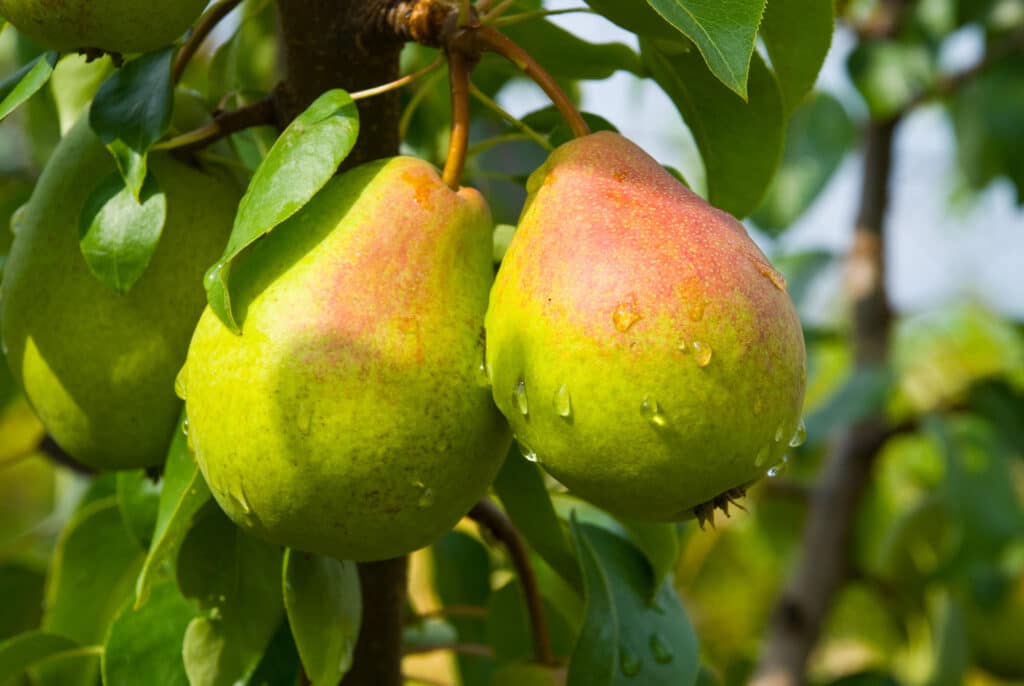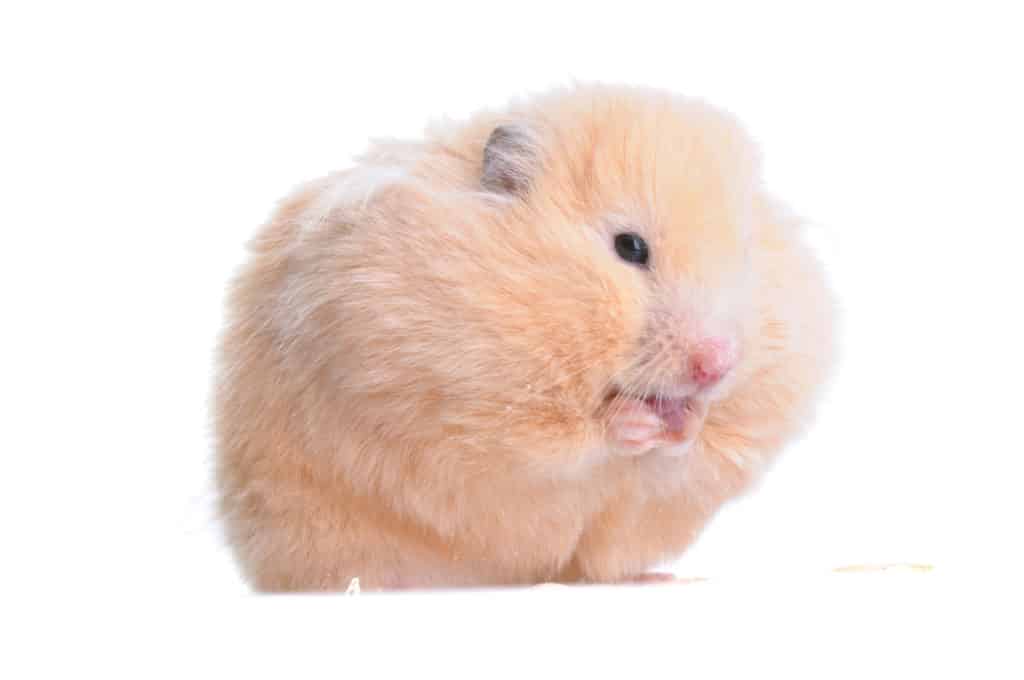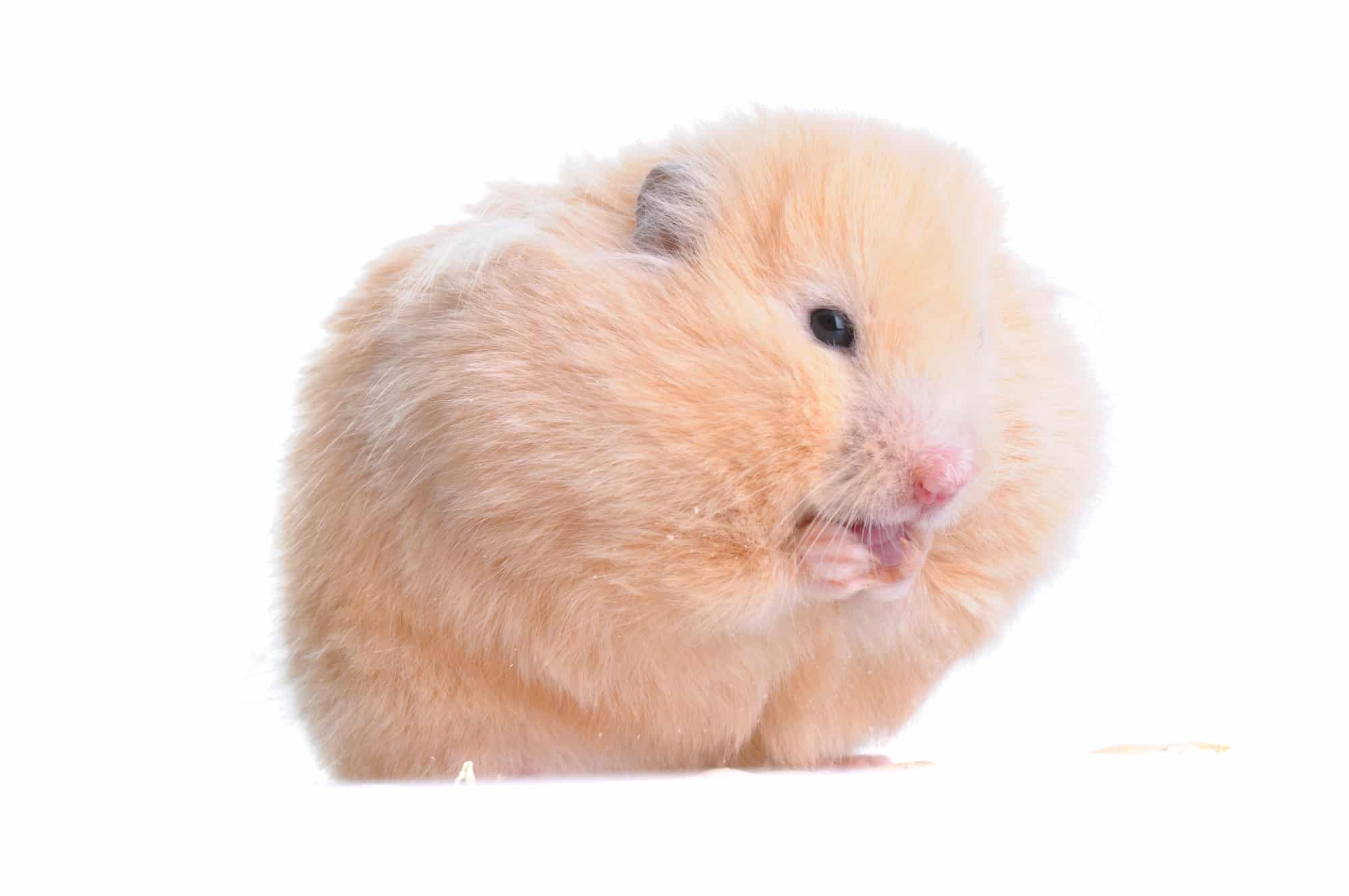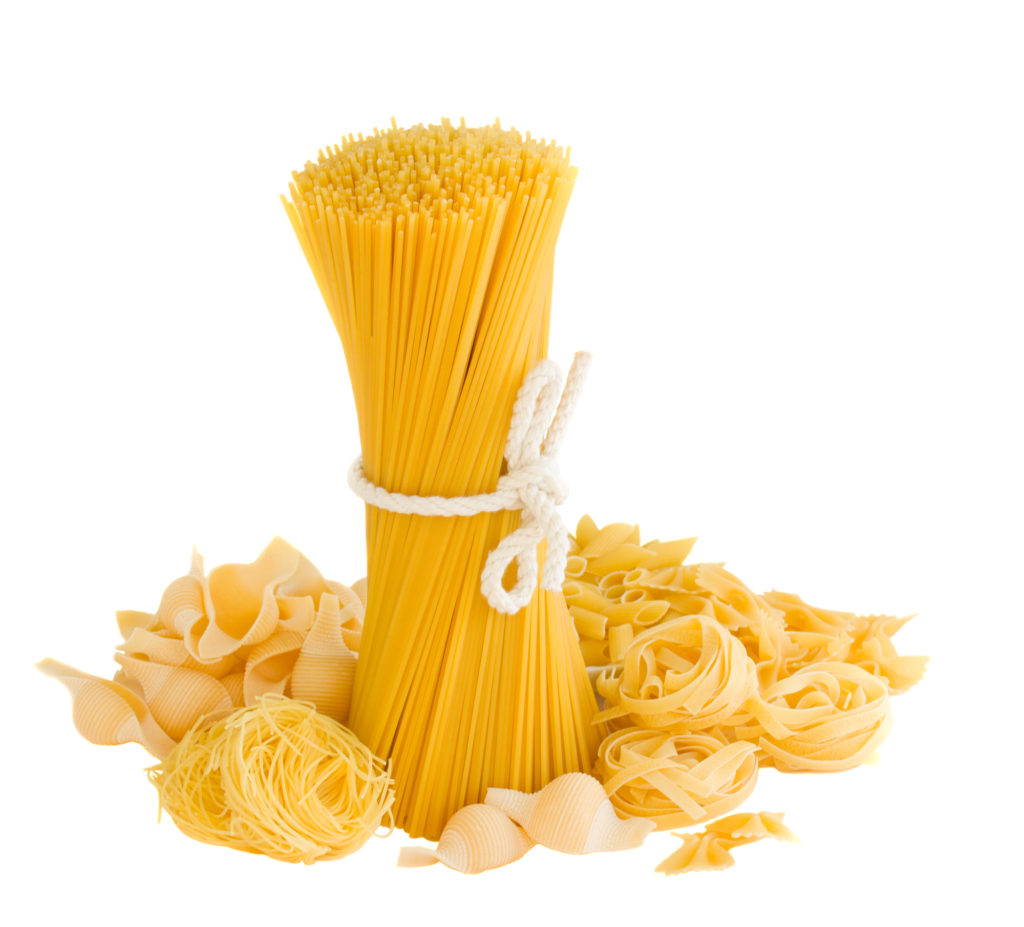Hamsters are small pets whose lifespan ranges between 2 – 3 years. They have very sensitive digestive systems. Therefore, their lifespan depends directly on the food they eat. Some fruits and vegetables might be safe for hamsters, while others might be harmful. Therefore, as a pet owner, you should evaluate the suitability of a fruit/vegetable before giving it to your hamster. Pears contain vitamins, protein, fiber, and minerals that can be beneficial. But can hamsters eat pears? Continue reading to find out.
Pears
Pears are mild, sweet fruits with a fibrous center. There are over 3,000 types of pears worldwide. The most common types of pears are Comice, Forelle, Red Anjou, Green Anju, Seckel, Concorde, Bartlett, and Bosc (Source: USA Pears). Different types vary in shape, size, crispness, and sweetness. Pears are excellent sources of vitamin C, potassium, and vitamin K. In addition, they contain smaller amounts of folate, iron, calcium, riboflavin, magnesium, and vitamin B6 as well. These minerals and vitamins significantly reduce the risk of diabetes, gut problems, and heart disease.

Origin
Pear has been consumed as a fruit since prehistoric times. The Chinese started cultivating pears as early as 2000 B.C. (Source: Wikipedia). Pears soon became a favorite food of the Romans and the Greeks. Romans ate pears, both cooked and raw. The juicy flavor and sweet taste of pears soon made the Greeks consider pears as ‘Gifts from the gods.’
Soon, the Romans started cultivating pears. They created almost 50 varieties of pears. They planted these varieties across Europe.
The European settlers took pears with them. The first pear tree in the USA was planted in the year 1620 (Source: Wisconsin Department of Public Instruction). Within a century, it became a favorite fruit of the European settlers. Today, pears are grown in 88 countries across the world, with China accounting for more than 69% of the world’s production (as of 2020) (Source: Wikipedia).
Can hamsters eat pears?
Nutrients in Pears
Every pet owner likes to treat their hamsters from time to time. Pear is an ideal treat for hamsters, only if given in moderation. Pears are nutrient-dense fruits that can boost your hamster’s health. The nutritional make-up of 100g of pears is listed below:

(Source: Fat Secret)
Health benefits of pears
1. Support heart health
Pears contain nutrients, such as potassium and magnesium, which keep the heart healthy. These nutrients help the blood vessels relax, thus keeping blood pressure within healthy levels. According to animal studies, the antioxidant mangiferin in pears can promote heart health. This antioxidant plays a remarkable role in protecting heart cells against oxidative stress, inflammation, and cell death.
2. Strong immune system
Vitamin C is vital in improving the immune system. Vitamin C in pears helps fight pathogens and other disease-causing microorganisms that can deteriorate your hamster’s health.
3. Reduce the risk of cancer
Pears are great sources of polyphenols, which have anticancer properties. Just like other pets, hamsters can also get cancer. Some breeds of hamsters might be more prone to cancer than others, but age is a common factor that increases the risk. In addition, female hamsters are more prone to cancer than male hamsters because of the wide range of cancers that involve the female reproductive tract. Polyphenols in pears can protect your hamster against oxidative stress, which is a harmful process linked to cancer. Also, polyphenols inhibit the growth of cancer cells.
4. Anti-aging properties
Pears are great sources of antioxidants, such as flavonoids and polyphenols. These antioxidants play a significant role in reducing the aging process of your hamster. Pears can also prevent several degenerative diseases, including cerebrovascular and cardiovascular diseases.
5. Combat inflammation
Hamsters infested with ear mites are more prone to inflammation, especially around the face, ears, tail, and feet. Various vitamins and minerals in pears can help in combating inflammation, including vitamin C, copper, and vitamin K. Chronic or long-term inflammation can deteriorate the health of your hamster. Therefore, you should introduce pear into the diet of your hamster.
6. Promote gut health
Pears are great sources of soluble and insoluble fiber, vital for digestive and gut health. Both these types of dietary fiber help improve the digestive system of your hamster, thus lowering the risk of diarrhea.
Soluble fiber promotes the growth of healthy bacteria in your hamster’s gut. This will improve immunity and healthy aging.
Risks
Pears are good for hamsters only when given in moderation. Overfeeding pears can increase the risk of various health problems. These health issues are:
1. Obesity
Too many pears can make your hamster overweight and lethargic. Just like in humans, obesity can increase the risk of health problems in hamsters, such as liver problems, diabetes, heart problems, and other chronic health issues. An obese hamster won’t show interest in exercise, which can help in boosting the quality of life.
2. Diabetes
Pears contain natural sugars. According to science, foods and fruits rich in natural sugars can increase the risk of type 2 diabetes. In addition, overfeeding your hamster with sugars can cause tooth problems. Therefore, choose types of pears with minimal sugar content. Severe, untreated diabetes in hamsters can trigger multiple health problems like cardiovascular diseases, cataracts, and kidney failure. The symptoms of diabetes in hamsters are:
– Excessive thirst
– Hyperactivity or lack of energy
– Increased appetite
– Excessive urination
– Sudden weight loss
– Sugary urine scent
If you detect these signs, it’s important to consult a veterinarian. A professional vet will diagnose your hamster’s health problem and offer proper treatment. In addition, he will recommend the ideal diet to help control diabetes.
3. Abscess formation
Hamsters have a tendency to store their treats and other foods in their cheek pouches. Uneaten pears can rot and lead to abscess formation if the cheek pouch has an injury. This health problem can be painful for your tiny furry friend.
4. Gastrointestinal problems
Pears are excellent sources of fiber, which help in boosting the health of the gastrointestinal tract of your hamster. However, a hamster will suffer from gastrointestinal issues if he consumes too much pear. This is because the increased dietary fiber intake can lead to vomiting, diarrhea, and other serious health issues. To keep your hamster healthy, you need to feed him a wide variety of food items. Avoid feeding your hamster pears on a regular basis. Below are signs and symptoms of gastrointestinal Problems in hamsters:
– Change in appetite
– Personality change
– Change in sleeping patterns
– Diarrhea
– Vomiting
Untreated gastrointestinal problems can worsen your hamster’s health by deteriorating the immune system. Therefore, ensure you visit your vet before the problem escalates.
Pear products
There are different forms of pear products available on the market. Can your hamsters eat any of them? Keep reading to find out.
Can you give pear juice to hamsters?
It’s not a great idea to give your hamster pear juice because it contains added sugars. Increased sugar consumption can cause diabetes and obesity in hamsters. In addition to that, the nutrient density of pear juice is less, especially when compared to fresh pear fruit.
Can you give pear pie to hamsters?
Pear pie contains ingredients that can pose health risks to your hamster. It contains added sugars and flavors that can deteriorate the health of your small furry friend, especially in the long run.
Can you give pear cinder to hamsters?
A hamster should never drink alcoholic substances, including pear cinder. These products contain toxic and harmful substances that can cause health problems to your furry friend or even death.
Can you give canned pears to hamsters?
Canned pears aren’t suitable for hamsters because they contain preservatives and other unsafe ingredients, such as sugar. Feeding your hamster canned pears can make him sick. Therefore, pet owners should stick to fresh pears.
How to give pears to hamsters?
Feed your hamster plain, unsalted, and unsweetened pears. In addition, you should clean the pear thoroughly to eliminate pests and pesticides on the skin.
The riper the pear, the higher its sugar content. So, do not give your hamster pears that are too ripe. Give only pears that are barely ripe and a little crisp.
Different breeds of hamsters vs. Pears
Can Chinese dwarf hamsters eat pears?
Chinese dwarf hamsters can eat leafy greens and tasty fruits, such as pears. But they are prone to diabetes. So, give them a very tiny piece of pear once a week. Moreover, opt for types of pears with low sugar content.
Can Campbell dwarf hamsters eat pears?
Campbell dwarf hamsters are also prone to diabetes. So, give them only a very tiny piece of pear once a week. Moreover, opt for types of pears with low sugar content.
Can Winter White hamsters eat pears?
Winter White hamsters are not prone to diabetes as much as the above-mentioned types of pet hamsters. But they are also dwarf hamsters. So, their digestive systems are not that strong. Hence, they can’t handle too much sugar. Therefore give them only a very tiny piece of pear once a week.
Can Roborovksi hamsters eat pears?
Roborovski hamsters are the smallest species of hamsters. But they are also extremely active. So, they can burn sugars faster than other dwarf hamsters. Therefore, you can give them more pear when compared to dwarf hamsters. You can give Robos a teaspoon of pear every fortnight. But don’t give the entire teaspoon at once. Divide it into small portions and give one portion every few days.
Can Syrian hamsters eat pears?
Syrian hamsters are the largest pet hamster species. Hence, their digestive systems can tolerate more sugar than other species. So, you can give Syrian hamsters a teaspoon of pear every week (Source: Just Hamsters).
FAQ
Can hamsters eat pear seeds?
No, it’s not a good idea to feed your furry friend pear seeds. Pear seeds contain a toxin called cyanogenic glycoside, which transforms into the poisonous chemical hydrogen cyanide upon chewing (Source: Canadian Food Inspection Agency). Moreover, pear seeds are tiny. Therefore, it’s hard for your hamster to digest them.
Hence, hamsters should not eat pear seeds. Pet owners should feed their hamsters pears in moderation. This will lower the risk of feeding your hamster pear seeds.
Do hamsters like pears?
All breeds of hamsters love pears. However, some dwarf hamsters may not like them.
How much pear can you feed your hamster?
Generally, you should feed your hamster a small amount of pear. Provide pears to your hamster as a treat, not as a part of his daily diet. The amount of pears that you can feed your hamster depends on the breed.
Some hamsters may not like pears; therefore, it’s important to determine your hamster’s tastes and preferences. In addition to that, if you notice some abnormal behavior in your hamster after he eats pears, consult a vet. The vet will conduct some tests to determine the root cause of the health problem and recommend the best medication.
Can hamsters eat pear skin?
Pear skin is not as nutritious as the flesh of the fruit. Moreover, it can contain pesticides. So, don’t give your hamsters pear skin. Ensure you peel the fruit carefully and slice it into small pieces.
How Often Can a Hamster Eat Pears?
The answer to this question depends on which type of hamster you have. Please refer to the Section ‘Different breeds of hamsters vs. pears’ in this blog post for more information.
Feeding pears to hamsters in moderation can improve their health and overall well-being. Don’t give pears to your hamster on the same day you give some other sweet fruit. This can increase sugar consumption, increasing the risk of type 2 diabetes and obesity. If you have a dwarf hamster, avoid sugary types of pears because dwarf hamsters are sensitive to sugar.
What can hamsters eat other than pears?
Hamsters can eat a wide range of foods, such as sprouts, carrot tops, beets, green beans, cucumber, watercress, celery, asparagus, cauliflower, broccoli, tomato, sweet potato, summer squash, bell pepper, spinach, and mint. For more information, read:
Ensure you feed your hamster with extra-small quantities of these foods. This is because some foods might compromise the health of your hamster. Consult your vet to find out if your hamster is allergic to any food items.
Conclusion
All breeds of hamsters can eat pears in small quantities. Pears are loaded with nutrients, which can boost the health of your hamster. There are numerous benefits of eating pears: they reduce the risk of cancer, promote gut health, possess anti-aging properties, boost the immune system, combat inflammation, and support heart health.
However, there are various drawbacks of giving too much pear to your hamster, such as gastrointestinal problems, abscess formation, high risk of diabetes, and obesity. Therefore, pet owners should feed their hamsters pears only in moderation. In addition, if your furry friend is allergic to new treats and foods, consult your vet before giving pears to your hamster.



